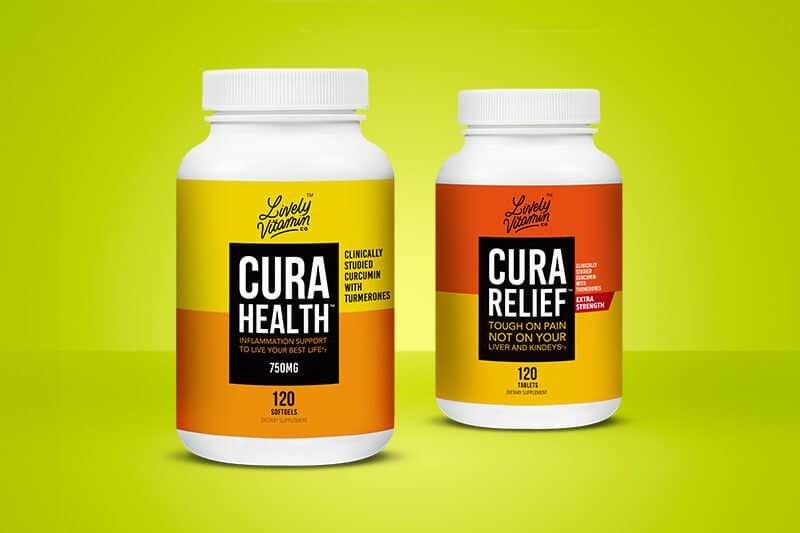
What Is The Difference Between Turmeric and Curcumin?
Reviewed by Lisa Blohm, PhD, MSN, RN
CuraHealth is an effective, natural, and potent supplement for supporting the liver, brain, immune system, and — you guessed it — heart health. With an ORAC value of over 1,500,000, it is jam-packed with antioxidants and full-spectrum curcuminoids. Each softgel in CuraHealth contains a powerhouse of natural ingredients known to reduce inflammation and boost oxygen.
CuraHealth is an award-winning formula and is made with the ONLY PATENTED curcumin with turmeric essential oil containing ar-turmerone (a major bioactive compound that scientists claim to be more powerful than curcumin itself).
SUBSCRIBE ON YOUTUBE FOR MORE HEALTH-RELATED VIDEOS!
What Is The Difference Between Turmeric and Curcumin?
There’s no doubt that turmeric hasbecome a health-food staple. It’s cropped up as an added ingredient in seemingly everything these days! From smoothies to skincare products, baked goods to beverages, and everything in between, there’s no denying that turmeric is having its moment. But, what about curcumin? It’s a term that’s not as widely discussed, but is a compound you need to know about if you’ve been eyeing turmeric and want to add it to your diet. Here’s a look at the two terms — because what is the difference between turmeric and curcumin, anyway?
What is Turmeric?

If you’ve ever taken a look at your curry dinner or added a generous helping of mustard to your sandwich, then you’re familiar with turmeric. It’s responsible for the vibrant color in both foods. If not, here’s a quick rundown on turmeric:
- Turmeric is a popular spice
- It comes from the root of the Curcuma longa plant
- It’s a botanical that’s part of the ginger family
- Turmeric’s a rhizome, so it grows horizontally
- It’s native to Southeast Asia, China, and India
- It seriously stains, so beware before use!
Turmeric is often referred to as ‘Indian saffron’ because it’s a staple in Indian cuisine. It’s also used in recipes across the world, especially in recent years. But, if you see a smoothie recipe or juice cleanse that calls for a generous portion of turmeric, think twice before you add a big scoop and indulge! When eaten raw, turmeric is quite bitter to taste. It’s definitely best enjoyed when cooked into a recipe.
Turmeric is applauded for its seemingly magical effect on the people who eat it! And this is exactly why it’s been the main ingredient in so many turmeric supplements and turmeric home remedies for thousands of years.
- Turmeric root is often used for medicinal purposes
- It contains active curcuminoids, which are the reason it’s healthy!
- Turmeric has been credited with some impressive health benefits
From Traditional Chinese medicine to Ayurveda, modern health trends, and everything in between, it seems turmeric is seen as an ingredient that can help with almost anything. It’s used to provide immune system support, help you heal when you’re facing an infection or other illness, when you’re experiencing occasional joint pain, and so much more.
What is Curcumin?

There’s a whole lot of confusing information out there that can make it tough to answer the questions: what is the difference between turmeric and curcumin? But, despite all the misinformation, the concept is pretty simple. Curcumin is a compound that’s found within turmeric. And it’s an active compound at that! Thanks to the biological properties of curcumin, turmeric is considered healthy and beneficial. Without curcumin, turmeric would just be a bright yellow, delicious spice.
Here’s what you need to know about Curcumin:
- Curcumin is the most abundant curcuminoid found in turmeric
- Curcumin is also the most studied curcuminoid in turmeric
- It’s responsible for the vibrant color
All this means that when you’re looking for a turmeric supplement or considering adding it to your diet for its potential benefits, it’s curcumin that you really want to reach for. We have curcumin to credit for turmeric’s superpowers! Curcumin may be the most abundant curcuminoid in turmeric, but even then, it only makes up 2-5% of turmeric root. Additionally, it’s difficult for your body to absorb — but more on that later.
The Difference Between Turmeric and Curcumin Health Benefits

Turmeric has been used in Traditional Chinese Medicine and Aduyvera for thousands of years. There are countless accounts of turmeric helping with specific health concerns. In more recent years, turmeric has been studied extensively to see which of these claims can be substantiated by trials and western medical standards.
But, there’s one thing that’s been shown true: turmeric has curcumin to thank for its health benefits. As mentioned, turmeric is full of curcuminoids, which makes it a valuable addition to your diet. But, its most abundant curcuminoid, curcumin, that’s the real standout. Here are some things curcumin is good for in the body:
- Turmeric is a powerful antioxidant: The curcuminoids in turmeric help your body fight free radicals to prevent oxidative stress. If your immune system is forced to work too hard, for too long, it can lead to early-onset age-related issues. Turmeric, and its rich antioxidant properties, give your immune system some extra support.*
- Turmeric benefits your brain: When you add it to your diet, turmeric, or more specifically, its active compound curcumin, promotes overall cognitive function. It’s also been shown to help defend against age-related cognitive decline to keep you thinking on your toes for years to come.*
- Turmeric may help if you’re in occasional pain: If an area of your body is agitated or otherwise inflamed, you’ll likely experience some discomfort and occasional pain. Turmeric and its active compounds support your body and help you have a healthy inflammatory response instead. Tumeric is a gentle, whole-food nutrient that provides foundational support for inflammation in the body in a similar way that other foods rich in antioxidants do.*
- Turmeric is heart-healthy: Heart issues are a concern for many people and it’s especially important to support cardiovascular wellness as you age. Turmeric helps you do just that. It’s been shown to boost heart health with its antioxidant properties and to support your blood vessels so they stay strong.*
- Turmeric boosts your mood: If you’re not in the best frame of mind, have been dealing with occasional depression, or sometimes get super stressed and anxious, turn to turmeric! It’s been studied for its mood-boosting benefits and the results are impressive. Turmeric helps increase BDNF (brain-derived neurotrophic factor) levels in your brain, which is something that’s been shown to help improve symptoms of occasional depression.*
- Turmeric supports your skin: There’s a reason turmeric shows up in plenty of skincare recipes. And that’s because it’s been used to help with a host of skin issues. Adding it to your diet in supplement form has also been shown as an effective way to support skin health.*
- Turmeric helps prevent premature aging: Is there such a thing as an anti-aging ingredient that’ll turn back time? No. But, what we do know, is that turmeric, and its antioxidant powers, fight free radicals that can cause oxidative stress. Oxidative stress is responsible for aging in your body. It’ll cause wrinkles, a breakdown in tissue elasticity, nutrient absorption issues. You get the idea. And taking turmeric? It helps prevent oxidative stress. So, while it’s not a magical anti-aging time eraser, turmeric is beneficial for vitality and longevity.*
Which Should You Choose?

Sure, you can consume turmeric and it is a healthy ingredient to add to any recipe. But, the active compound, the part of the herb that’s responsible for its seriously impressive benefits, that’s curcumin — and curcumin only makes up about 2-5% of turmeric. What does that mean? When you consider the two options head to head, turmeric vs curcumin, it’s more beneficial to consume a concentrated amount of the active compound and reach for curcumin.
Curcumin can be extracted from turmeric, which is typically how curcumin supplements are made. This makes it easy for you to add curcumin to your diet, every day, without trying to consume massive amounts of curry every day!
How To Choose The Best Curcumin Supplement

So, now that you know you want to add more curcumin to your diet, where do you start? There are a few things to keep in mind when considering a curcumin supplement to help you determine which one is best.
- Bioavailability is key: When it comes to curcumin, our bodies aren’t naturally equipped to absorb it well. This means it’s important to look for a curcumin supplement that’s formulated with absorption in mind. Many have added ingredients, like black pepper extract, that help to increase curcumin’s bioavailability.
- Concentration matters: When choosing a curcumin supplement, look for one that contains a potent dose of the supportive ingredient. In order for you to experience any of the health benefits, you’ll need to consume a significant daily amount for your body.
- Look for other beneficial ingredients: When choosing a curcumin supplement, consider the rest of the ingredient list as well. Many are formulated to add even more health support with bonus ingredients. It’s a good idea to choose a supplement with some synergistic additional ingredients for even greater support.
Our Favorite Curcumin Supplements
If you’re ready to select a turmeric supplement and to add curcumin to your diet, The Healthy Place has several options to choose from. Whether you want a supplement that contains only concentrated curcumin, or you’re looking for something that’s formulated to multitask with multiple beneficial ingredients, we’ve got options for you.
- When you want to help your body have a healthy inflammatory response, try Lively Vitamin Co. CuraHealth. It’s formulated with your occasionally sore body in mind — and that’s because it contains a seriously impressive form of curcumin! This curcumin supplement features an ingredient called BCM-95. It’s made for bioavailability, so you don’t have to worry about whether or not you’ll be able to absorb this supplement when you add it to your diet. Plus, the formula contains an impressive ORAC (Oxygen Radical Absorbance Capacity) value of more than 1,500,000 antioxidants. All these active compounds work together to support a healthy inflammatory response in your body!*
- When you’re looking for safe pain relief, try Lively Vitamin Co. CuraRelief. If you’re in occasional pain and don’t want to turn to pharmaceuticals for relief, CuraRelief is the formula for you. It’s made using the same ultra-powerful and ultra-absorbable BCM-95 Curcumin as the CuraHealth recipe. But, it’s made even more impressive with the addition of ingredients like Boswellia, DLPA, and Nattokinase.*
- When you want a seriously potent dose of Curcumin, try Terry Naturally Curamin. It contains the ever-impressive BCM-95 Curcumin, which works up to 10x better than some other curcumin supplements. Seriously! Plus, it’s formulated with Nattokinase, to help deliver the curcumin compounds to every area of your body and a reduced Boswellia extract for added support.*
There’s nothing fun about experiencing occasional pain or inflammation. But, now that you’re armed with an answer to the question ‘what’s the difference between turmeric and curcumin?’ you can go forth and choose the best supplement to support your health needs. And help with your occasional pain, safely and naturally! If you have questions about our curcumin supplements or another health topic, don’t hesitate to reach out to our team. We’re happy to help! Contact us here.